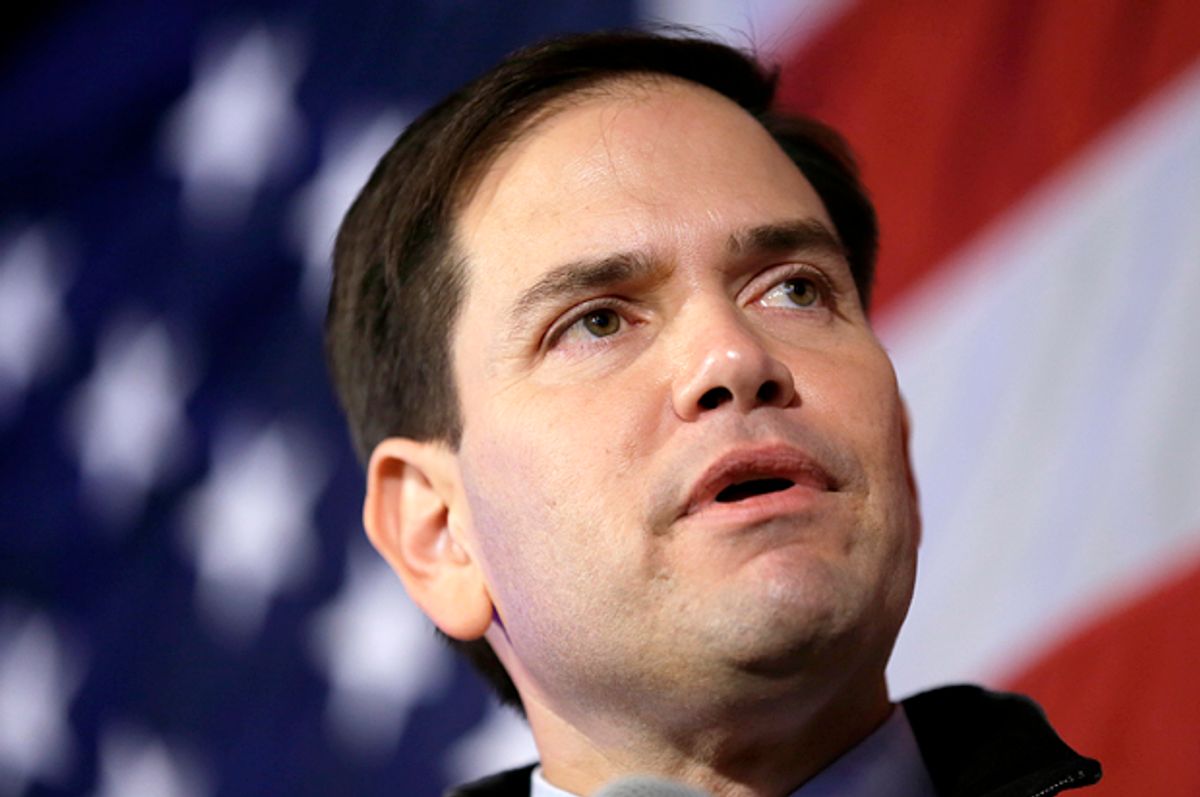Over the weekend, Republican presidential candidate and self-styled foreign policy whiz Marco Rubio appeared on “Fox News Sunday” and offered an uncharacteristically frank assessment of national security politics following the Islamic State’s terrorist attack in Paris. Host Chris Wallace tossed Rubio a softball, asking him if his “foreign policy credentials are giving you a boost with voters as they focus more on choosing a commander in chief with all of these terror attacks.” Rubio, happy to oblige the interviewer’s presumption that he is in fact a foreign policy expert, said “I obviously am not happy about the events from last week in Paris, but I think it's a positive development that it suddenly has cast -- forced Americans to confront more carefully the issue of national security.”
That “positive development” quip was a little too honest, as was his follow-up statement: “I hope we focus on that more, not just for political advantage, but because the world has become a very dangerous place.” It’s never a good look when you come right and say the upside to terrorist attacks is that they help your poll numbers. But Rubio tends to get away with nonsense like this because, as Wallace’s question made clear, there’s a presumption of foreign policy seriousness and expertise surrounding Rubio that is seemingly impervious to the things he actually says. When it comes to the Islamic State in particular, Rubio’s word is the only thing we have to go on when he says this issue benefits him, given that his policy prescriptions and public statements on the topic are an incoherent tangle of contradictions.
These days, Rubio is a vocal and harsh critic of the Obama administration’s strategy for dealing with the Islamic State. However, no one ever seems to point out that the plan laid out by President Obama to tackle ISIS in 2014 was very, very similar to the plan put forth by Marco Rubio at the time. Obama called for a “systematic campaign of airstrikes,” “increas[ing] our support to forces fighting these terrorists on the ground,” arming Syrian rebels, providing intelligence and training to Kurdish and Iraqi forces, and pressuring neighboring states to get into the fight. Rubio’s plan, laid out in a Washington Post Op-Ed, called for a “sustained air campaign,” “increas[ing] our efforts to equip and capacitate non-jihadists in Syria,” arming and supporting “Iraqi partners and the Kurds,” and “persuad[ing] nations in the region threatened by the Islamic State to participate in real efforts to defeat it.”
Not a lot of daylight there, but Rubio went to great pains to confuse the issue as much as possible, alternating between attacking Obama for being an isolationist wimp and supporting Obama for implementing portions of the ISIS strategy he agreed with. Rubio took just about every position one could imagine, changing his posture towards the president’s ISIS strategy from aggressive criticism to soft support on an almost daily basis. The White House’s plan to defeat ISIS – which, remember, was also Rubio’s plan – has thus far not succeeded, and so in the aftermath of Paris, Rubio has a new ISIS strategy that pays no homage to his previous strategy.
According to the new plan, Rubio will tackle ISIS by: 1) “stopping the flow of Syrian refugees into the United States;” 2) increasing the defense budget; 3) “build[ing] a multinational coalition of countries willing to send troops into Iraq and Syria to aid local forces on the ground;” 4) strong-arming the Iraqi government into halting its political repression of Sunni Muslims; and 5) deposing Syrian dictator Bashar al-Assad.
As Paul Waldman points out, this “plan” is a mix of useless policy prescriptions and oversimplified stupidity. Syrian refugees and defense spending levels have nothing to do with ISIS’s continued existence. Building a multinational anti-ISIS coalition and pressuring the Iraqi government to stop being poisonously sectarian are part of the Obama administration’s current plan, but Rubio will be better at it because yadda yadda whatever. And as for taking down Assad, Rubio puts it out there as something so self-evidently easy that it doesn’t require explanation. He’ll accomplish it with no-fly zones and “safe zones” to blunt Assad’s air and ground forces (he doesn’t elaborate on what that will entail). And what about Assad’s regional allies Russia and Iran? “I would oppose Russia and Iran in their fight to prolong Assad’s brutal regime,” Rubio writes. Oh, well, don’t I feel dumb for asking.
This gets us back to the original point: people just assume Rubio is strong on foreign policy because Rubio tells them he’s strong on foreign policy. And so when he says that the ISIS attacks in Paris are a “positive development” politically for him and the GOP, he’s taken at his word, even though on this very issue Rubio has been erratic, incoherent, and flat-out wrong.



Shares